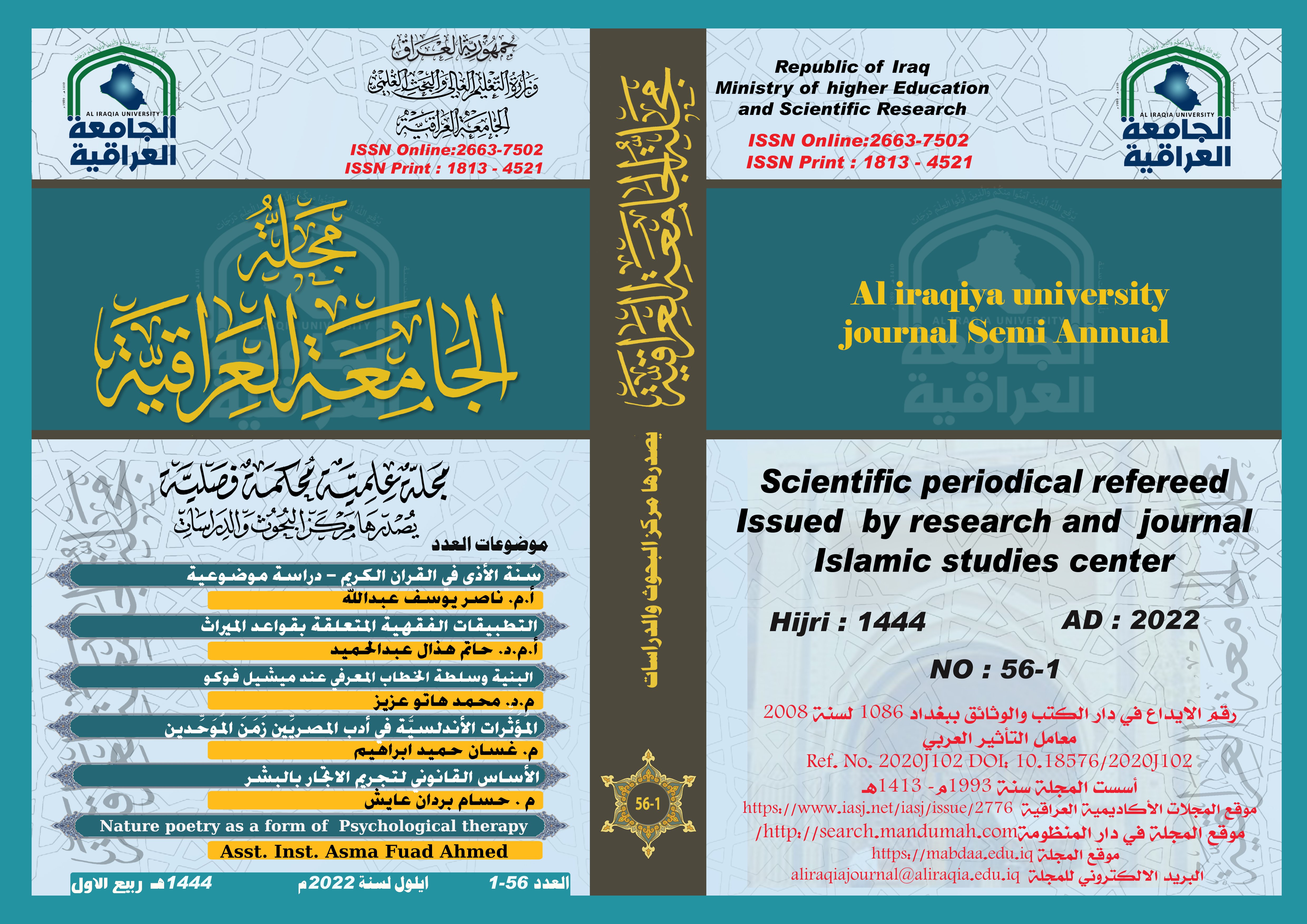Abstract
The research deals with the topic,, the temporal adverbs in German and Arabic with the help of the corpus of Quran“ to translate the meanings of the Holy Quran. The research study of the subject is a semantic analytical study. The researchers noted some errors in the translation of the temporal adverbs in the translation of the Quran of the German Orientalist Rudy Barrett and the reason for this is the semantic lack of understanding of some temporal adverbs in Arabic, for example the word(covenant) in verse 86 of Sura Taha: ( So Moses returned to his people in a state of anger and sorrow. He said: “O my people! Did your Lord not make a goodly promise to you? Did the time appointed then appear too long for you? Or did you wish that wrath from your Lord should descend upon you, that you broke your promise to me?). The translation of the word (covenant) into German in return was (commitment) which is not correct based on its close equivalent, therefore the following questions were asked:-
1- What are the grammatical and semantic conditions of the temporal terms in both languages?
2- What is the competence of the temporal word in Arabic in determining of what temporal is and what is it’s equivalent in German?
According to the comparative method of the research, the research addressed the temporal adverbs in German and in Arabic from the grammatical and semantic sides in both languages and the statement of their types and the emphasis on the temporal adverbs. So because of too many words of temporal adverbs in both languages, the researchers only addressed the temporal adverbs for the day and night in both languages, citing the corpus of the holy quran of the german orientalist Rudy Barrett. The most important finding sought by the researchers is that the number of temporal adverbs indicating the hours of the day and night in German is lower than in Arabic, which led to a difference between the temporal adverbs between the two languages in the semantics of the word at the level of the translation equivalent. The researchers recommended that the subject in question be given more research because of variety of temporal words and multiple translations.
1- What are the grammatical and semantic conditions of the temporal terms in both languages?
2- What is the competence of the temporal word in Arabic in determining of what temporal is and what is it’s equivalent in German?
According to the comparative method of the research, the research addressed the temporal adverbs in German and in Arabic from the grammatical and semantic sides in both languages and the statement of their types and the emphasis on the temporal adverbs. So because of too many words of temporal adverbs in both languages, the researchers only addressed the temporal adverbs for the day and night in both languages, citing the corpus of the holy quran of the german orientalist Rudy Barrett. The most important finding sought by the researchers is that the number of temporal adverbs indicating the hours of the day and night in German is lower than in Arabic, which led to a difference between the temporal adverbs between the two languages in the semantics of the word at the level of the translation equivalent. The researchers recommended that the subject in question be given more research because of variety of temporal words and multiple translations.
Keywords
Corpus of Quran.
difference of meaning
difference of two languages as to temporal adverbs
semantic understanding
Temporal words
translation equivalent
Abstract
يتناول البحث موضوع ) ظررف الزمان في اللغة الألمانية واللغة العربية بالإستعانة بالمكنز القرآني ) دراسة تحليلية دلالية لترجمة معاني القران الكريم. لاحظ الباحثان أخطاء في ترجمة الفاظ الزمن في كتاب ترجمة معاني الفران الكريم للمستشرق الألماني رودي باريت وذلك يرجع سببه الى عدم الفهم الدلالي لبعض الفاظ الزمن في العربية فمثلا كلمة (العهد) في الآية رقم 86 من سورة طه (فَرَجَعَ موسى إلى قَوۡمِهِۦ غَضۡبَـٰنَ أَسِفࣰاۚ قَالَ یَـٰقَوۡمِ أَلَمۡ یَعِدۡكُمۡ رَبُّكُمۡ وَعۡدًا حَسَنًاۚ أَفَطَالَ عَلَیۡكُمُ ٱلۡعَهۡدُ أَمۡ أَرَدتُّمۡ أَن یَحِلَّ عَلَیۡكُمۡ غَضَبࣱ مِّن رَّبِّكُمۡ فَأَخۡلَفۡتُم مَّوۡعِدِی) فكانت الترجمة لكلمة العهد الزمنية بمقابلها القريب وهو (الالتزام) وبناءا على هذا تم طرح السؤالين التاليين:-
1- ماهي الأحوال النحوية والدلالية للألفاظ الزمنية في اللغتين؟
2- ما مدى اختصاص اللفظة الزمنية في اللغة العربية في تحديد ماهية الزمن وتحديده وما يماثله في اللغة الألمانية؟ وفي ضوء منهج البحث التقابلي عالج البحث الظرف في اللغة الألمانية والعربية من الجانبين النحوي والدلالي وبيان أنواعها والتأكيد على الألفاظ الزمنية ولكثرة الفاظ الزمن في اللغتين فقد اكتفى الباحثان بمعالجة الفاظ الزمن لليوم والليلة في اللغتين مستشهدان بالمكنز اللغوي للقران الكريم للمترجم رودي باريت. ان اهم ما توصل اليه الباحثان أن عدد الفاظ الزمن الدالة على ساعات اليوم والليلة في الألمانية اقل عما هي عليه في اللغة العربية مما أدى الى اختلاف بين الفاظ الزمن بين اللغتين في دلالة اللفظة على المستوى المكافئ الترجمي. وقد أوصى الباحثان بإيلاء الموضوع الذي هو قيد البحث، المزيد من البحث وذلك لكثرة الالفاظ وتعدد الترجمات.
1- ماهي الأحوال النحوية والدلالية للألفاظ الزمنية في اللغتين؟
2- ما مدى اختصاص اللفظة الزمنية في اللغة العربية في تحديد ماهية الزمن وتحديده وما يماثله في اللغة الألمانية؟ وفي ضوء منهج البحث التقابلي عالج البحث الظرف في اللغة الألمانية والعربية من الجانبين النحوي والدلالي وبيان أنواعها والتأكيد على الألفاظ الزمنية ولكثرة الفاظ الزمن في اللغتين فقد اكتفى الباحثان بمعالجة الفاظ الزمن لليوم والليلة في اللغتين مستشهدان بالمكنز اللغوي للقران الكريم للمترجم رودي باريت. ان اهم ما توصل اليه الباحثان أن عدد الفاظ الزمن الدالة على ساعات اليوم والليلة في الألمانية اقل عما هي عليه في اللغة العربية مما أدى الى اختلاف بين الفاظ الزمن بين اللغتين في دلالة اللفظة على المستوى المكافئ الترجمي. وقد أوصى الباحثان بإيلاء الموضوع الذي هو قيد البحث، المزيد من البحث وذلك لكثرة الالفاظ وتعدد الترجمات.
Keywords
الكلمات المفتاحية: الفاظ الزمن، الفهم الدِلالي، المكافئ الترجمي، اختلاف اللغتين في الفاظ الزمن، إختلاف المعنى، المكنز القرأني.
